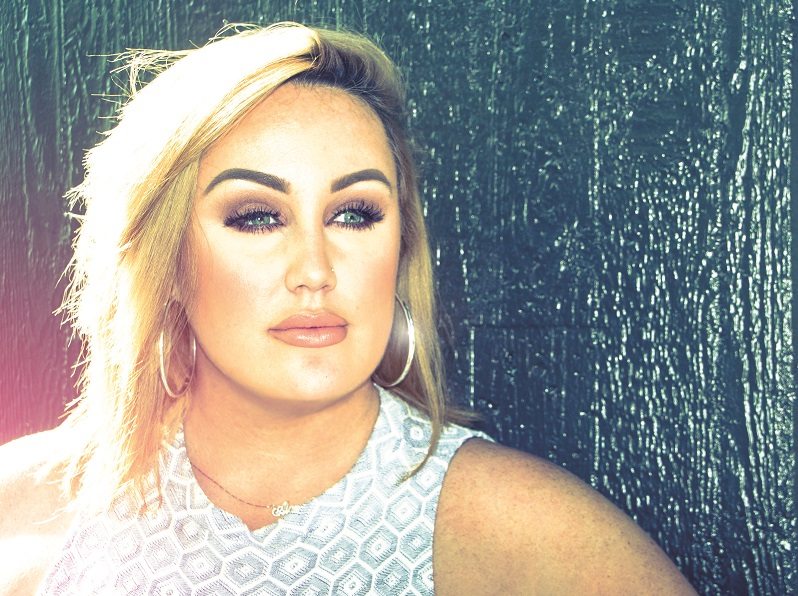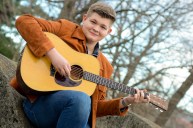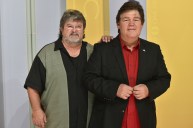As a goaltender for the University of Wisconsin's powerhouse women's hockey team from 2007-2010, Atlanta-based country singer and songwriter Alannah McCready earned crossover appeal beyond her admiration of pop music.
Videos by Wide Open Country
College athletes, from former Oklahoma State Cowboy Garth Brooks on down, can have a competitive advantage of sorts while chasing a country music career. Journalists get a ready-made human interest story, and fans of the singer's alma mater feel clued in about a potential hit-maker. For McCready, her past experiences draw attention to her music at a time when sports fans are still buzzing about the US Olympic women's hockey team's historic gold medal win. It also helps that Nashville adores its championship-caliber Predators.
The toughness and competitiveness McCready brought to the ice, paired with the life experiences of an ambitious young woman, inform forthcoming album Ricochet Heart (out April 27). Advance single "Last Girl Standing" and its music video channel the sass and righteous anger of both Loretta Lynn and Carrie Underwood. It displays storytelling talents worthy of the former, yet fans of the latter can dance along.
McCready recently chatted with Wide Open Country about her hockey past and a musical future informed by her life experiences and diverse tastes.
BM: One thing that sticks out, obviously, is your hockey background...
AM: It's a little strange to go from hockey player to country singer, I've noticed. I've sang all of my life, and I grew up in Minnesota where if you don't play hockey growing up, you're strange anyways. Both things have been a huge part of my life. The hockey chapter went all the way through college and a few years after college, and now I'm doing the music chapter, which hopefully is the last chapter.
BM: I'm from Georgia. Here, it seems like everybody gets to play tee-ball. All the boys and girls in the neighborhood get to do that, then some move on to baseball or softball...
AM: That's definitely a Southern thing, for sure.
BM: But is hockey like that? Does everyone take part when you're little, and then it branches off and eventually becomes kind of a boys' club, in a way?
AM: Yeah, it weeds out. It seems like a big community, but it's a very small world. On a certain level, everybody knows everyone.
BM: It says in your bio that at one point you played in boys' leagues. Were there not enough girls participating at the time to put together a team, or had you advanced beyond your peers?
AM: Women's hockey has really boomed in the past 15 or 20 years. When I was growing up, there were not a lot of women's teams or girls' teams. Not every school had one like they do now. I wanted to be as competitive as possible, knowing I wanted to play beyond middle school, so I switched over and played with the boys to see if I could get ahead of my time, really. Then I switched back once I got to high school and played on the girls' team, but in the summers I'd play on boys' teams. It was a faster pace, and as a goaltender, what you need is to be able to be as fast as possible.
So I played with the boys in the summer, but I was also on a triple-A team with girls who took it seriously. We'd travel around and play in tournaments in the Midwest and Canada. It turns into a year-round sport.
BM: As far as women's hockey getting more popular goes, how huge was the Winter Olympics this year?
AM: It was huge. In that gold medal game, I had -- I think it was nine teammates from Wisconsin between the two teams (Canada and the US). That was a proud moment for me, knowing those girls and knowing that it was their dream. I've talked to a few of them, and they're just through the roof, even until today.
BM: Hopefully it's like that Women's World Cup team from when we were kids that changed American perceptions of soccer, much less women's soccer.
AM: For sure, especially when you're looking at the men's team not doing as well. Having that sort of representation on a world stage is amazing.
BM: You'd mentioned you've been singing your whole life. What got you interested in music?
AM: I'm from Oklahoma, so I grew up on country music. Unfortunately, there's video and photo evidence of me giving concerts in my parents' living room when I was about two or three years old in a full cowgirl outfit that my parents would love to show everyone, always. From that point forward, it's something I always loved. For every moment, there's music.
Then I finally started to be in choir once I got in school. My mom was like, "Oh, you really like doing this, and you're kind of good at it!" I was like, "Thanks, Mom!" It wasn't until middle school that doing this became my ultimate dream as a career.
BM: Was there any kind of strategy for sticking with hockey and attending college before pursuing a music career?
AM: It was tough because I was the only athlete in my school also in choir. When there were concerts the same nights as games, I had to make that choice. There were 5, 6, 12 sopranos in choir and only one goalie, so I had to sort of make a decision there. I'd go in and sing my parts to the choir director to get credit and then go play the game that night. I just sort of made it work. I'd sing the national anthem before home games in my equipment on the ice. That's probably an awkward sight for some people.
BM: You had a job in sports in New York before moving South. With young people not necessarily landing careers in their desired field nowadays, were you hesitant to leave that job or did you believe in the music and want the music enough to sort of throw caution to the wind?
AM: I was definitely comfortable with my job. I loved my job and was doing what I went to school for so it was fun for me. This is always what I wanted to do, and I knew when that opportunity came up that if I didn't do it then, I'd never do it. I'd get comfortable, stay where I am and live my life. I would've regretted not doing it, so I just went full-force.
BM: Did you always stick with your childhood love of country music, or did you go through phases as a listener and performer?
AM: I listen to everything, which I hope is evident in my music. It's more of a hybrid country. Country has always been the heart of the songwriting and storytelling. As far as other music, I listen to everything. I listen to a lot of rap music. I rap every song that comes on the radio. Two minutes later, I'm listening to someone cry in a country song, and I love it just as much.
BM: In closing, let's talk a little about your next album, Ricochet Heart.
AM: This project is more cohesive with how my life is right now (than past releases). It's got a girl power element to it. This one's a really personal album, which is why I'm excited for people to hear it.
BM: Do you wish someone had shared a message like the one in "Last Girl Standing" with you while you were 25?
AM: For sure. You'll notice in the liner notes that my friends played a big role in this album. I'm sort of like their sounding board whenever they go through things. A lot of these songs were influenced by stories my best friends have been through or that I've been through. You know, we all just turned 30 last year or this year, and I feel like we've been through a lot of things that a woman can go through. If we're going through it, it's not just us. I'm hoping that other girls can relate, too.




